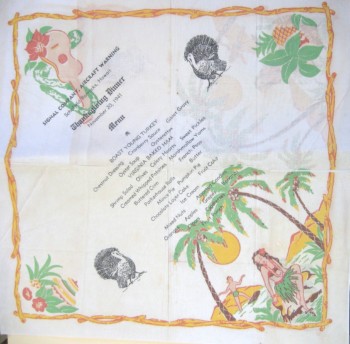Thanksgiving: Pearl Harbor, 1941, and 75 Years On
 Three score and 15 years ago, our country was deeply divided. There were the isolationists and the interventionists, the former insisting on an America First that turned its back on the rest of the world, the latter deeply concerned about the rise of totalitarian regimes abroad and their threat to democracy at home.
Three score and 15 years ago, our country was deeply divided. There were the isolationists and the interventionists, the former insisting on an America First that turned its back on the rest of the world, the latter deeply concerned about the rise of totalitarian regimes abroad and their threat to democracy at home.
That was our country on Thanksgiving 1941. Less than three weeks later, in an instant, everything changed, and nothing, it seemed, would ever be the same again. Sometimes, it takes a cataclysmic event to bring us together. Remember the Maine? Of course not. Remember Pearl Harbor? Perhaps. Remember 9/11? Most certainly.
It is the calm before the storm that we also recall in retrospect. That beautiful clear morning with the bluest of blue skies over Manhattan—and at the Pentagon. The Sunday of December 7, 1941, when Washington’s professional football team was defeating the Philadelphia Eagles at old Griffith Stadium by a score of 20 to 14, a victory soon overshadowed by the Japanese attack on Pearl Harbor and U.S. entry into World War II.
President Franklin Delano Roosevelt called it “a date which will live in infamy,” but infamy doesn’t always last. Unless, perhaps, an artifact suddenly appears to remind us. It was the rarest of finds: a Thanksgiving napkin menu from Signal Company, Aircraft Warning, Schofield Barracks, Hawaii. The date: Nov. 20, 1941. Seventeen days later, Schofield was strafed by Japanese aircraft headed for the U.S. Pacific Fleet at Pearl Harbor.
This 13 1/2-inch square napkin was folded inside a loose-leaf binder of paper ephemera in a Western Maryland antique shop when I acquired it for $2 (reduced from $5). But, of course, it is priceless. And here we are, 75 years on.
It was that same day, Nov. 26, 1941, when FDR signed a bill officially designating the fourth Thursday in November as Thanksgiving.
The United States was celebrating its last peacetime Thanksgiving for four years. One can only surmise what it must have been like as the Signal Company, Aircraft Warning chowed down at Schofield Barracks. Before them was a veritable feast, a last supper.
The diamond-shaped napkin includes idyllic if dated images: a woman in a grass skirt and lei, the smaller figure of a male surfer in the background, both under palm trees and sun; a ukulele, a pineapple, turkeys. Then an all-American menu with everything from soup (oyster) to nuts (mixed), plus roast young turkey, chestnut dressing, cranberry sauce, giblet gravy, Virginia baked ham, shrimp salad, creamed whipped potatoes, marshmallow yams, Parker house rolls, mince pie, pumpkin pie, chocolate layer cake, fruit cake, ice cream, assorted candies, oranges, apples, grapes, bananas, cigars, cigarettes, and, to wash it all down, fruit punch.
The squadron would be Pearl’s initial line of defense. Its job would be to sound the first alarm of any imminent attack, and that Thanksgiving was more than turkey day at Schofield. It was also when the Aircraft Warning squadron moved radar equipment to the top of a hill overlooking the Pacific. At 7:02 a.m. on Dec. 7, radar spotted more than 50 planes. The operator who phoned in a report was told it was likely a fleet of B-17 Flying Fortresses from San Francisco. The Japanese went on to Pearl Harbor, which became a watery grave for 3,000 Americans, as the Al Qaida attacks would take nearly 3,000 lives three generations later.
As pre-Pearl America was emerging from the shadow of the Great Depression and barely paying attention to world events, pre-9/11 America was poised to continue as the world’s remaining superpower on the optimistic path of peace and prosperity. In the near future, the optimism would be shattered by wars in Iraq and Afghanistan, the Great Recession, more frequent extreme weather events linked to climate change, an unprecedented refugee crisis.
In both eras, a great nation was oblivious to dangers it should have foreseen. Now, all we can do is memorialize the dead. Sept. 11, 2011 was a national day of sadness, as so should be Dec. 7. But let today be a day of thanksgiving, and a day to reaffirm our country’s core principles, enunciated by FDR, a month after attack, as the Four Freedoms: Freedom of Speech and Expression, Freedom of Worship, Freedom from Want, Freedom from Fear. They, too, are worth remembering, and fighting for, and not just overseas.
Lovely story — and storytelling, Gene.
Super artifact. Super story, Gene. Brooke
How much is the thanksgiving napkins worth?
I was wondering because I have one it was my dad’s
Hi Gene, I found one of these too from my Grandfather who was a survivor of Pearl Harbor. The heading on his napkin is different as it was for “Company ‘C’ 35th Infantry.”
So I feel each company/platoon may have had their own menu meal. Let me know and I can share a pic with you.